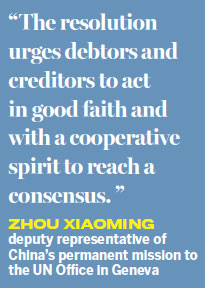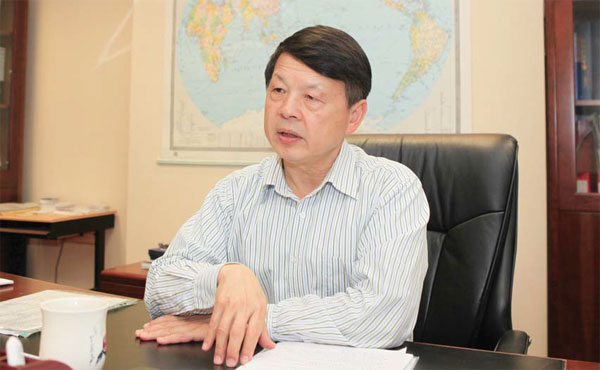Determined to help deal with debt

China has shown its support for poor countries in economic difficulties and is committed to realizing UN goals, diplomat says
China is increasingly providing mutually beneficial growth opportunities for less-developed countries and economies hit by the current debt crisis, according to veteran diplomat Zhou Xiaoming.
Such opportunities, he says, are being created via multinational institutions such as the Asian Infrastructure Investment Bank and the New Development Bank (formerly BRICS Bank), and organizations like the United Nations.
| Veteran diplomat Zhou Xiaoming says China's experience, resources and technology can be shared with other developing countries. Cecily Liu / China Daily |
"China is increasingly engaging in discussions on the UN platform, as the country recognizes much of the organization's work is in line with its own agenda and that the UN has a fair system for all countries' voices to be heard," says Zhou, who is deputy representative of China's permanent mission to the UN Office in Geneva.
"In addition, China is championing an improved global economic environment, whereby developing countries are integrated into a fairer global economic and financial architecture, and can increasingly generate sustainable growth. Such initiative is coherent with what China wants to achieve through its G20 presidency (starting in September), which is to facilitate global growth and promote better financial governance."

China is participating in long-term development programs at the UN, especially to help realize the Sustainable Development Goals adopted last year, following the country's major contribution to the Millennium Development Goals, which led to tremendous global growth between 2000 and 2015, he says.
China showed its support for the new goals when President Xi Jinping attended the UN General Assembly that launched them in September and announced a number of major initiatives, including a South-South Cooperation Fund with an initial pledge of $2 billion to help developing countries implement a sweeping sustainable development agenda over the next 15 years.
Between 1990 and 2015, more than 470 million people in China were lifted out of extreme poverty, according to data from the UN Development Programme.
As the Sustainable Development Goals aims to lift another 1 billion worldwide out of poverty by 2030, China's experience, resources and technology can be shared with other developing countries, Zhou says.
"To lift a billion people out of poverty in 15 years could be a more challenging task than we realize, if we just think that China only lifted about 400 million out of poverty between 1990 and now, and that during this time our GDP has been growing at a double-digit rate. To achieve the goal desired by the UN, it's crucial we work together in partnership and make use of the power of multinational platforms."
He says China's contribution toward poverty reduction is twofold: "We still have about 100 million people in China living below the poverty line, so we need to eliminate poverty domestically. Internationally, we can contribute in many ways: trade expansion, economic aid, productive capacity building, and infrastructure development. Also, technology transfer will help developing countries to accelerate growth."
China's support of a UN resolution for debt-burdened developing countries last year helped in restructuring their debt in a way that allowed their economies to grow in a sustainable way, Zhou says.
"The resolution urges debtors and creditors to act in good faith and with a cooperative spirit to reach a consensus. Crucial to this resolution is a clause that allows debt-burdened sovereign states to design macroeconomic policy, including the restructuring of their sovereign debt, meaning their future development will not be impeded by unfair terms set by creditors."
Such a clause is beneficial when considered within the context of the Argentinean debt crisis, which has for the past decade seen the country battle a small group of hedge funds that refused to join a deal it had agreed with more than 90 percent of creditors.
The deal would have allowed Argentina to pay back its debt at huge discounts, but the hedge funds refused and took the matter to court in New York, consequently prompting a new default by the country. Greece faced similar problems.
The UN resolution, passed with 136 supporting votes, including that of China, was met with opposition from creditor nations such as the United States, Germany and the United Kingdom, and the European Union abstained as a whole.
"China is also a significant creditor globally, but it has supported the UN resolution, demonstrating its genuine desire to ensure that developing countries will not be crushed by undue burden of sovereign debt."
China, while still a developing nation, has become a global player in the world economy and a major international lender. Loans from the China Development Bank and the Export-Import Bank of China to investment in African countries have, for example, outnumbered the lending of the World Bank.
In addition to supporting the UN resolution, China is also exempting the debt of outstanding intergovernmental interest-free loans due by the end of 2015 owed by the least-developed countries, landlocked developing countries and small island developing countries, as announced by Xi at the UN assembly meeting last year.
Zhou, who served as minister counselor in the economic and commercial office at the Chinese embassy in London before taking up his post in Geneva last year, has seen China's rapid emergence onto the world stage through his extensive career as a diplomat.
In particular, over the past five years, he says there has been tremendous growth in UK-China relations, especially in financial services, property, high-technology manufacturing, creative industries, energy and infrastructure.

He attributes the growth to the UK economy being open to foreign businesses, and China's enhanced capability to meet the UK's financing needs. In addition, the UK's expertise in building a knowledge economy is also helpful to China as the country experiences a structural transition from a growth model fueled by manufacturing to one led by services and consumption.
Looking ahead, Zhou believes China will become further integrated in the world economy as it takes a leadership role in reviving global growth.
"At a time when the global economy is seeing economic slowdown, China is determined to play a major role in pushing through a revival through growth initiatives that create better connectivity and further trade and investment links between countries, as well as create a better governance framework and environment for poor countries to develop more quickly, leading to win-win growth globally."
cecily.liu@chinadaily.com.cn
(China Daily European Weekly 03/25/2016 page32)
Today's Top News
- Takaichi must stop rubbing salt in wounds, retract Taiwan remarks
- Millions vie for civil service jobs
- Chinese landmark trade corridor handles over 5m TEUs
- China holds first national civil service exam since raising eligibility age cap
- Xi's article on CPC self-reform to be published
- Xi stresses improving long-term mechanisms for cyberspace governance































